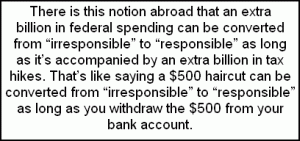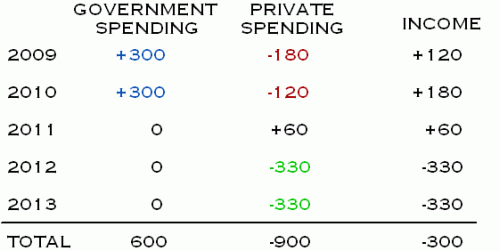Having blogged twice this week (here and here) on Paul Krugman’s green economics essay, I want to add a couple of quick comments on what it takes to contribute usefully to this discussion.
Archive for the 'Policy' Category
Yesterday I blogged about Paul Krugman’s recent piece on climate control policy. The bottom line: After recovering from a shaky start, Krugman does a good job of laying out the issues and posing many (though not quite all) of the right questions. But I’m not sure he gets the answers right.
A few years ago, writing in Slate, I listed the key questions that the Al Gores of the world mostly fail to address or even acknowledge. (See also the discussion on pages 186-190 of The Big Questions.) Krugman (thankfully) is no Al Gore, and he does address most of these questions. Let’s see how he does with them.
 |
 |
 |
Halfway through reading Paul Krugman’s New York Times piece on green economics, I had my snarky retort all ready to go. Then in the second half he went and got all reasonable on me. I still don’t buy his conclusions, but (sadly for readers who like fireworks), he’s not (at least in this instance) nuts.
Today is the ninety-ninth anniversary of the legendary fire at the Triangle Shirtwaist Factory, which reigned for ninety years as the worst workplace disaster in New York history. A hundred and forty six workers died that day, most of them young women. Escape routes were cut off by doors that were kept locked to prevent employee pilfering. The main exit from the factory floor was designed so that only one person at a time could pass through; departing workers had their handbags inspected by a night watchman. “It comes down to dollars and cents against human life, no matter how you look at it”, in the words of then-Fire Chief Edward Croker.
Well, yes, of course it comes down, at least in part, to dollars and cents against human life (where “dollars and cents” are, of course, stand-ins for “a whole lot of other things we care about”). The interesting question is whether the terms of trade were favorable. In other words: If the workers, in advance of the fire, had been fully informed of all the risks and all the potential consequences, would they have wanted those doors locked or open? Or more generally: When the New York state legislature responded to the fire with over two dozen new occupational health and safety laws, were they compounding the disaster?

|

|
Suppose that year after year, you spend more than you earn. You are worried that you’ve become fiscally irresponsible. Which of the following is not a path back to fiscal sanity for your household?
- Spend less.
- Earn more.
- Stop at the ATM more often so you’ll have more cash in your pocket.
Do we all understand why the answer is C? Good. Now let’s try another one.
The Obama administration has its knickers all in a twist over rising health insurance premiums. As you wade through the rhetoric, here are a few things to keep in mind:
-
Greed does not cause rate hikes. I’m not sure why some premiums have shot up lately, but I’m quite sure that “greed” is not the answer. That’s because I’m quite sure that the insurance companies are no greedier today than they were a year ago. To explain a change in prices, you’ve got to point to something that’s changed. Greed is pretty much a constant.
 Yesterday my lunch companion announced his new weight loss strategy—he’s eating more cake. He’s got it figured that if he eats enough cake now, it will motivate him to take up running someday (even though he’s never run before). So he ordered a slice of chocolate cake and announced that he’d just lost two pounds.
Yesterday my lunch companion announced his new weight loss strategy—he’s eating more cake. He’s got it figured that if he eats enough cake now, it will motivate him to take up running someday (even though he’s never run before). So he ordered a slice of chocolate cake and announced that he’d just lost two pounds.
Of course, my friend wasn’t entirely serious; he was just gearing up for a possible future at the Congressional Budget Office, which says we can reduce government spending by enacting the president’s health reform proposal. They’ve got it figured that if we pass this proposal now, it will motivate future cuts in Medicare (even though nobody’s ever had the stomach for those cuts before). If I understand the numbers right, they’re counting that as a “saving” of several hundred billion dollars. Well, pass me that cake.
Harvard’s Robert Barro, who is good at this stuff, estimates (in round numbers) the effects of last year’s stimulus package (numbers represent billions of dollars):

The executive summary is that income (that is, the total income of all Americans) rises in 2009 and 2010 (while the stimulus money is being spent), and continues a bit higher for another year after that, but falls in later years (when the taxes, with their accompanying disincentive effects, come due). (Of course, the day of reckoning can be delayed, but not forever—so the arithmetic still rules). Adding up over five years, income falls by $300 billion, or about $1000 per American.
These numbers confirm my prejudice that the stimulus package is a bad idea, but they still make me uncomfortable. Let me first add a few remarks about what the numbers mean and then I’ll tell you what I don’t quite get about them.
Continue reading ‘So How’s That Fiscal Stimulus Working For You?’
Yesterday’s post on child labor generated some great comments, and I’d like to respond briefly to a few of them here.
Jambaramba asked whether low wages for children are a result of their poor bargaining position. I responded that you can’t raise wages nationwide through bargaining. (You might raise them in one sector, but only at the cost of lowering them in other sectors, and overall you’ll make people poorer, not richer.) The only way to raise wages is to make people more productive. This means providing them with more and better capital and giving them opportunities to trade. Manfred followed up with a super comment elaborating on this point. I promise to blog about the supporting theory and evidence sometime soon.
Caitlin Flanagan is such a smashingly good writer that I normally devour anything she’s written. But when I saw her latest piece in the Atlantic—roughly 5000 words in opposition to public school gardens, where students learn horticulture instead of long division—it seemed well, too petty a subject for Flanagan’s vast talents—so I put it aside without reading it.
Today I read it. Wow, was I wrong. This is Caitlin Flanagan at her blistering best. I’ll offer you a few choice quotes, but my real recommendation is to leave now and go read the entire piece.
With the Edible Schoolyard..the idea of a school as a venue in which to advance a social agenda has reached rock bottom. This kind of misuse of instructional time…has been employed to cheat kids out of thousands of crucial learning hours over the years, so that they might be indoctrinated in whatever the fashionable idea of the moment or the school district might be. One year it’s hygiene and the another it’s anti-Communism; in one city it’s safe-sex “outercourse” and in another it’s abstinence-only education.
Does the immigrant farm worker dream that his child will learn to enjoy manual labor, or that his child will be freed from it?…If this patronizing agenda were promulgated in the Jim Crow South by a white man who was espousing a sharecropping curriculum for African American students, we would see it for what it is: A way of bestowing field work and low expectations on a giant population of students who might become troublesome if they actually got an education.
Until our kids have a decent chance at mastering the essential skills and knowledge that they will need to graduate from high school, we should devote every resource and every moment of their academic day to helping them realize that life-changing goal. Otherwise we become complicit—through our best intentions—in an act of theft that will not only contribute to the creation of a permanent, undereducated underclass, but will rob that group of the very force necessary to change its state.
There’s much more where that came from. Why are you still here?
 Congressman Donald Schwerbitz, who represented South Dakota back in the 1960s and 70s, was a visionary environmentalist who sponsored the first legislation designed to reduce our national carbon footprint. It was Congressman Schwerbitz who recognized that carbon emissions are caused primarily by breathing, and he proposed to cut those emissions in half by requiring every American to wear a device that plugs up one nostril.
Congressman Donald Schwerbitz, who represented South Dakota back in the 1960s and 70s, was a visionary environmentalist who sponsored the first legislation designed to reduce our national carbon footprint. It was Congressman Schwerbitz who recognized that carbon emissions are caused primarily by breathing, and he proposed to cut those emissions in half by requiring every American to wear a device that plugs up one nostril.
Back in March, 2001, I wrote a little fable about taxation for the op-ed piece of the Wall Street Journal. Several readers have asked me to post that fable here on the blog. Your wish is my command. At the bottom of this post, I’ll say a few words relating the fable to another recent blog post.
****************
Once upon a time, a man went to work and earned a dollar. He used the dollar to buy a share of stock. The stock paid a dividend of 10 cents a year, 10% being the going rate of return in the land.

When I teach economics, I try to drive home the lesson that words are supposed to mean something coherent. If you want to be rewarded for stringing together a bunch of empty phrases, you should go take an English class.
I was therefore maximally sympathetic to the poor XM radio host (I think it was Pete Dominick but I’m not sure) who was stuck interviewing a man named John Sakowicz last Friday. Sakowicz, who hosts his own radio show in northern California, was there to warn about the dangers inherent in our growing national debt. He was very clear about this much: the debt and its associated dangers are massive, explosive, perhaps even apocalyptic. He was entire unclear, however, about exactly what those dangers are.
Interviews with Democratic Representative Barney Frank and Republican Senator Richard Shelby are the final installments in BigThink’s series of video interviews on “What Went Wrong?” during the financial crisis. (You’ll also find links to all the previous installments.) If you have a taste for politics, you can comment here on what you thought of them.
I am opposed to all taxes on interest, dividends and other forms of capital income. Supporters of these taxes keep making the same fallacious argument. The purpose of this post is to shame those people out of ever making that argument again. (They are, of course, free to make other arguments.)
The fallacy I have in mind goes like this: First, economics teaches us that everything should be taxed at the same rate to avoid unnecessary distortions. Second, QED.
With appropriate caveats, the first part is true. The problem is with getting from there to the second part.
Whenever I ask about the reasoning underlying some legal principle or another, my friend the law professor is always quick to remind me that “there is no such thing as legal reasoning”. So it is with William Blackstone’s famous doctrine that it’s better for ten guilty men to escape than for one innocent to suffer. Why ten? Because that’s the first number that happened to enter Blackstone’s head; that’s why.
Writing 200 years after Blackstone, Emory Law School professor Alexander Volokh surveyed the history of alternatives to “ten” in a charming essay called n Guilty Men. The bottom line is that a great many alternatives have been offered, almost never with anything approaching a justification.
At Big Think, a consortium of bloggers (including me) have been invited to submit questions for use in video interviews with major players in the financial crisis. I posed a question to Mark Zandi, the chief economist at Moody’s, who had recently said this:
“It’s no coincidence that the great recession ended just as the stimulus package began providing its maximum economic benefit.”
My question was:
How do you know?
Here, from the video, is Mr. Zandi’s answer:
Over at National Review Online, John Derbyshire starts off with some kind words about The Big Questions, and then goes off on an ill-considered screed about immigration. First, by all means let’s quote the kind words:
Steven’s new book, The Big Questions, has a lot of good things in it, as one would expect from an author who proudly declares himself a math geek. His explanation of Heisenberg’s uncertainty principle (pages 135–141) is a model of clarity in the popularization of science. His geometrical illustration of a Talmudic rule on the division of an estate (pages 205–213) shows the mathematical imagination at its best.
Landsburg is an economist by profession — a professor of economics, in fact — and has the economist’s insight that many matters commonly discussed in terms of morality can be reduced to cold arithmetic: “When things are priced correctly, there’s no need to moralize about them.” He gives some illuminating examples.
But then things take a darker turn:
Over at Econlog, Arnold Kling chides me for the way I concluded yesterday’s post on health care and Harvard Professor David Cutler:
My gut instincts point me in a different direction that Professor Cutler’s do, but I think we agree on what the big problems are and on what would count as solutions. I think almost all economists would agree on that much, and that’s a lot.
Here is Arnold:
My disagreement with Cutler is more than mere gut instinct. Cutler and I might agree that there is overuse of medical procedures with high costs and low benefits. We might agree that incentives affect this. However, Cutler is confident that central planning represents the solution, not the problem. He believes that remote bureaucrats can measure health care quality well enough and implement compensation schemes that are fine-grained enough to achieve significant improvement.
For the record, Arnold and I are saying the same thing, though I tried to say it a little more politely. David Cutler, Arnold Kling and I all agree that incentives matter and that it’s important to get them right. Arnold Kling and I agree that David Cutler probably doesn’t know how to do that.
Yesterday I had the privilege of meeting David Cutler—Harvard health economist, advisor to President Obama, and co-author of much of the health reform legislation currently moving through Congress. While I am very skeptical of some of Professor Cutler’s policy goals, I was reminded once again that, for all our bickering around the edges, nearly all economists of all political stripes have a shared and useful way of thinking about the world.
I took the opportunity to ask Professor Cutler about a question that arose on this blog last week. I had posted about my fear that a public health insurance option would be manipulated by politicians intervening to get better coverage for their contributors and constituents, while passing the costs off to less well-connected groups. Some of the commenters—notably Cos and Sierra Black—asked whether this has been a problem in other countries. I had to admit that I had no idea, so I put the question to Professor Cutler. Here is what he said:
The people at Big Think have posted their latest videos in the “What Went Wrong” series about the financial crisis; I am one of a consortium of bloggers who have been invited to submit questions the interviewees and to blog about their answers.
The most interesting of the current interviews is with hedge fund manager Peter Thiel. A few choice quotes:
If you want to understand why a public health insurance option is such a bad idea, just imagine a world where we’ve passed the Coburn Amendment, requiring all members of Congress to subscribe to that public option. In that world, a powerful Senator who develops a hankering for a nose job can make a few phone calls and nudge the public insurance commissioner toward a new appreciation for the moral imperative of covering cosmetic surgery.
And if the Senator is successful, where do the funds come from? Either higher premiums, paid for mostly by subscribers who never wanted this kind of coverage, or by dipping into general revenues. After all, the funds have to come from somewhere.
With or without the Coburn Amendment, and however unlikely you might find this particular scenario, the public option is nakedly vulnerable to exactly this type of corruption. A Senator who would never dream of intervening quite so blatantly on his own behalf might think nothing of intervening on behalf of a big campaign contributor, and will certainly think nothing of intervening on behalf of politically potent interest groups—that, after all, is what politicians do for a living.
 James Hansen heads the NASA Goddard Institute for Space Studies. If you have a question about radiative transfer in planetary atmospheres, he’s your go-to guy. But if you have a question about economics—say, about the merits of cap-and-trade programs—you might want to consult a different sort of specialist. Hansen’s recent New York Times piece provides ample confirmation of that.
James Hansen heads the NASA Goddard Institute for Space Studies. If you have a question about radiative transfer in planetary atmospheres, he’s your go-to guy. But if you have a question about economics—say, about the merits of cap-and-trade programs—you might want to consult a different sort of specialist. Hansen’s recent New York Times piece provides ample confirmation of that.
The column oozes nonsense throughout, but it will be instructive to hone in on one exceptionally silly paragraph. Here is Hansen trying to explain why cap-and-trade is inferior to a carbon tax:
Consider the perverse effect cap and trade has on altruistic actions. Say you decide to buy a small, high-efficiency car. That reduces your emissions, but not your country’s. Instead, it allows somebody else to buy a bigger S.U.V.—because the total emissions are set by the cap.
I am part of a consortium of bloggers who have been recruited by the proprietors of Big Think to explore the roots of the financial crisis. Big Think is conducting a series of video interviews with a variety of experts; we bloggers are invited to submit questions to be asked in these interviews, and we have agreed to blog more or less simultaneously about those interviews as they are posted.
The first interview, with David Wessel of the Wall Street Journal, is now posted. Some of what he says strikes me as right, some strikes me as wrong, and some strikes me as confusing.
After the philosopher Daniel Dennett was rushed to the hospital for lifesaving surgery to replace a damaged aorta, he had an epiphany:
I saw with greater clarity than ever before in my life that when I say “Thank goodness!” this is not merely a euphemism for “Thank God!” (We atheists don’t believe that there is any God to thank.) I really do mean thank goodness! There is a lot of goodness in this world, and more goodness every day, and this fantastic human-made fabric of excellence is genuinely responsible for the fact that I am alive today. It is a worthy recipient of the gratitude I feel today, and I want to celebrate that fact here and now.
I am a proud member of the Sierra Club. No, not that Sierra Club; what I mean to say is that I am a regular reader of the parenting blog ChildWild, and a fan of its wise and charming proprietor Sierra Black. I am therefore delighted that Sierra seems to have become a regular reader and frequent commenter here on The Big Questions, and glad to see she’s sticking around despite frequent disagreements—much as I do on ChildWild.
Over on another thread, amidst a discussion of the case for free trade, Sierra threw me for a brief loop with an issue I’d never seen raised before, though I’ve since learned that it’s commonplace in certain corners of the Internet. I thought, then, that it might be worth responding in a separate post.
(I’ll admit too that another motive for the separate post was my conviction that I’d be able to slip in a perfect pun around the phrase “Sierra, Madre”—Madre, of course. meaning mother, and what with her running a parenting blog and all and—well, it’s bad enough to have to explain your jokes, but here I am trying to explain a joke I couldn’t even figure out how to make. But by the time I’d realized the pun was stillborn, I was already committed to this post.)
Here’s the relevant part of Sierra’s comment:
Over on Econlog, Bryan Caplan uses an example from The Big Questions to illustrate his intuitionist approach to meta-ethics: Start with concrete, specific cases where your ethical intuition is clear, and reason by analogy from there. If you have multiple intuitions that lead you down conflicting paths, give some thought to which ones you’re most willing to jettison.
Bryan’s example is about discrimination, a subject that has come up before on this blog, but I want to emphasize that the argument Bryan quotes is quite separate from the arguments we got into in that earlier thread, and, for the sake of clarity, I hope we manage to keep them separate.
Bryan (paraphrasing me!) starts with the rather strong intuition that it’s okay for tenants and workers to discriminate. If you don’t want to live in an Albanian-owned building or an work for an Albanian employer, that’s your right (no matter how strongly we might strongly disapprove of your attitude). By analogy, then, it might seem that landlords and employers should have the same right to discriminate.
My post about Paul Krugman’s loopy proposals on employment policy generated some considerable discussion about why Europeans work so much less than Americans do. Actually, there are two separate questions here:
- Why do Europeans work less than Americans?
- Who’s happier?
A few observations:
Having recently bashed Paul Krugman, and in the full expectation that I’ll have occasion to bash him again, let me interject that Krugman is not just a first rate economist; he is also, when he wants to be, a superb economic communicator, with a long paper trail to prove it.
Take, for example his essay on the widespread failure of intellectuals to grasp Ricardo‘s theory of comparative advantage (the basis of the case for free trade). Instead of simply bemoaning the problem like the rest of us, Krugman makes a valiant and useful attempt to identify its root causes.
He starts with an analogy I’m also fond of (I’m not sure which of us has been using it longer): The theory of comparative advantage is like the theory of evolution by natural selection—to those who understand it, it is simple and compelling; yet non-experts can find it remarkably difficult to grasp.
In The Big Questions, I argue that this analogy ultimately breaks down: The theory of evolution is compelling largely because of the evidence that supports it, while Ricardo’s theory is compelling largely because of the logic that supports it. It’s not too surprising that a first-rate physicst or literary critic could be unfamiliar with a body of evidence, but it’s a little more unsettling when that same physicist or literary critic can’t follow a simple chain of logic.
It’s always impressive to see one person excel in two widely disparate activities: a first-rate mathematician who’s also a world class mountaineer, or a titan of industry who conducts symphony orchestras on the side. But sometimes I think Paul Krugman is out to top them all, by excelling in two activities that are not just disparate but diametrically opposed: economics (for which he was awarded a well-deserved Nobel Prize) and obliviousness to the lessons of economics (for which he’s been awarded a column at the New York Times).





